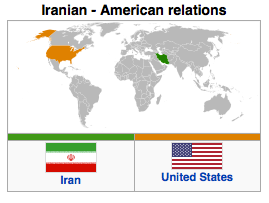US Sanctions Against Iran: Enough To Go Nuclear? – Analysis
By RSIS
Fresh US sanctions and Iran’s belligerent response have heightened tensions in the Persian Gulf. While Iran believes its revolution is under siege it is undeterred from pursuing its nuclear programme and believes it can survive the sanctions.
By Sajjad Ashraf
THE LATEST round of US sanctions against Iran has earned a belligerent response from Tehran and heightened tensions in the Persian Gulf. As the sanctions came into force Iran threatened to block the Straits of Hormuz, through which nearly 30 per cent seaborne oil passes. Last month Iran launched naval exercises and successfully test fired long range missiles in the Gulf. Iran simultaneously expressed its readiness to talk to the United Nations’ P-5 and Germany over the concerns relating to its nuclear programme.

The Iranian reaction was prompted by the belief of President Ahmedinejad’s government that the US wants a regime change in Tehran, including by military means. Iran sees the active US military deployment in the Gulf and the increased arming of its regional rivals as evidence of US designs to encircle Iran. These, ordinary Iranians feel, are sufficient grounds for Iran to acquire nuclear weapons. A 2010 University of Maryland survey found 38 per cent of Iranians supporting the building of nuclear weapons. Given the threat Iran feels now these numbers have surely gone up.
Siege mentality
The Iranian regime has noticed that the US adopts differing stances towards its adversaries and in its pursuit of curtailing the use of nuclear power. The US, they understand, waged war against non-nuclear Iraq but has chosen to pursue patient diplomacy with the nuclear armed North Korea and Pakistan. The Iranians believe that their revolution is under attack.
Their siege mentality is buttressed by the following factors: Iran continues to have prickly relations with most of the six Gulf Cooperation Council (GCC) states – all of them supported by the West. Iran is outspent militarily by at least three of its neighbours – Saudi Arabia, Israel and Turkey – all aligned to the US. The other states in the region are also arming themselves heavily with US-supplied weaponry. Following isolation and sanctions by the West, the Iranian conventional forces are equipped with obsolete weaponry compared to those of its regional adversaries.
While much is made of the IAEA reports condemning Iran, the latest IAEA Board of Governors Report released in November 2011 continues “to verify the non-diversion of declared nuclear material at [Iran’s] nuclear facilities”. And yet, Iran’s intentions continue to be doubted by the Western powers while Iran insists on exercising its “inalienable” right to nuclear power for peaceful purposes as provided under the Non-proliferation Treaty.
Sanctions not hurting?
The US claims that Iran’s bomb will substantially improve its ability to intimidate the smaller, oil rich but militarily vulnerable states in the region. However Iran argues that it has only gone for military action for defensive purposes, recalling the war against Saddam Hussein’s Iraq in the 1980s.
Iran understands that nuclear weaponry will not be able to cow the smaller states especially if they are backed by the US power. The real problem, according to Tehran, is US hegemonic ambition. Nevertheless there is little public support for the Iranian position in the Gulf states.
Meanwhile, according to Iranian sources, sanctions are not hurting Iran too much. It is selling 2.4 million barrels of oil a day at above US$100 barrel. As for the sanction against Iran’s Central Bank, they say many banks, unaffiliated with the US, are ready to trade; and so are new suppliers in many countries. While the use of these circuitous routes has pushed up prices, the money flow from rising energy prices offsets the costs. Given the Russian and Chinese reservations over the new UN sanctions Iran does not yet seem to be heading for a national collapse.
The US impression that the Iranian leadership will disintegrate under pressure is a serious miscalculation. With the string of US military bases around it, Iran obviously is resentful that it remains under siege by the West. The West’s posturing and sanctions actually bring consequences opposite to the ones sought by the US and these powers.
Sajjad Ashraf, Pakistan’s High Commissioner to Singapore 2004-2008, contributed this article specially to RSIS Commentaries. He is now an adjunct professor at the Lee Kuan Yew School of Public Policy, National University of Singapore and a Visiting Senior Research Fellow at the Institute of Southeast Asian Studies.
